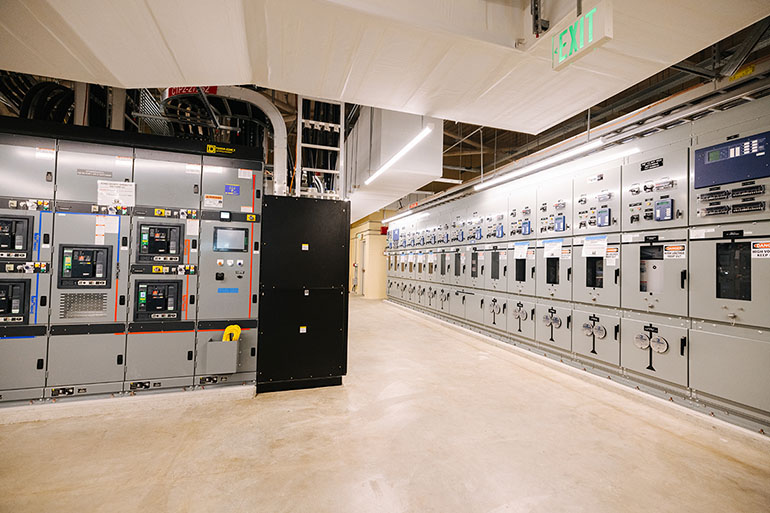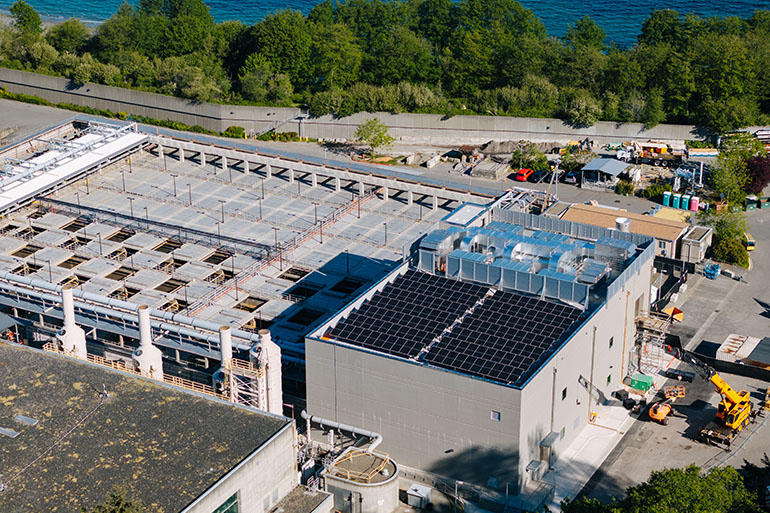King County’s new onsite battery system at West Point Treatment Plant proved its effectiveness during ‘bomb cyclone,’ providing operators with reliable power amid voltage sags
Summary
Nov. 20, 2024: During Tuesday night’s powerful windstorm, King County’s new 16.8-megawatt battery system provided West Point Treatment Plant operators with the clean, reliable power supply they needed to protect Puget Sound even as voltage sags occurred.
News
The new high-voltage battery system at King County's West Point Treatment Plant in Seattle proved to be effective during Tuesday night’s storm known as the “bomb cyclone,” providing frontline operators with the smooth power supply needed to protect Puget Sound and public health even as voltage sags occurred.
As powerful gusts swept through Western Washington overnight, the 16.8-megawatt battery system – which was completed this summer – kept pumps operating continuously at the state’s largest treatment plant.
“The massive onsite battery system we created at West Point Treatment Plant passed its first major test with flying colors, delivering reliable power during a significant storm,” said King County Executive Dow Constantine. “Despite multiple voltage sags, our frontline employees kept operations running smoothly throughout the night, ensuring Puget Sound was protected – proof that our ambitious upgrades have better prepared this critical infrastructure for severe weather events."
King County Wastewater Treatment Division activated the onsite batteries this summer, 3½ years after Executive Constantine signed an emergency declaration that expedited the ambitious capital project. As designed, the Power Quality Building that houses more than 48,000 battery cells helped prevent split-second voltage sags from the inbound power lines from shutting down the plant’s critical operating pumps. West Point Treatment Plant experienced seven voltage sags during Tuesday night’s storm severe enough to activate the new power quality system.

A momentary power disruption – similar to flickering lights – can cause electrical equipment to protectively shut down the treatment plant’s pumps. West Point has been vulnerable to emergency bypasses into Puget Sound, especially during severe storms when strong winds and heavy rainfall can cause power fluctuations, conditions that are expected to occur more often due to climate change.
The swift response from King County’s operators and crews positioned across its 424-square-mile service area helped weather the severe windstorm without any disruption to service.
“The major storm last night not only proved the effectiveness of our new onsite battery system, it highlighted the outstanding performance of our well-trained operators,” said Kamuron Gurol, Director of King County Wastewater Treatment Division. “With climate-resilient infrastructure and a highly skilled workforce, we’re better able to protect Puget Sound and public health.”

As of this morning, South Treatment Plant in Renton operated normally while a pump system at Brightwater Treatment Plant near Woodinville operated with generators. There were 22 pump stations systemwide that operated on generators while crews monitored equipment across the service area and cleared downed trees near facilities.
King County Wastewater Treatment Divisions is one of four divisions at the Department of Natural Resources and Parks.
Multimedia
- VIDEO: B-roll package of construction project available to download
- PHOTO GALLERY: Photos of power quality improvement
- VIDEO: Progress on power quality improvement project at West Point Treatment Plant
Resources
- Fully charged to protect Puget Sound: King County team delivers on Executive Constantine’s emergency declaration to provide West Point Treatment Plant with high-quality power
- Power quality improvement project at West Point Treatment Plant
Quotes
The massive onsite battery system we created at West Point Treatment Plant passed its first major test with flying colors, delivering reliable power during a significant storm. Despite multiple voltage sags, our frontline employees kept operations running smoothly throughout the night, ensuring Puget Sound was protected – proof that our ambitious upgrades have better prepared this critical infrastructure for severe weather events.
The major storm last night not only proved the effectiveness of our new onsite battery system, it highlighted the outstanding performance of our well-trained operators. With climate-resilient infrastructure and a highly skilled workforce, we’re better able to protect Puget Sound and public health.
 Translate
Translate